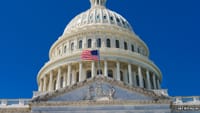Stop overpaying - start transferring money with Ogvio. Sign up, invite friends & grab Rewards now! 🎁
GENIUS Act Sets Guardrails for Stablecoin Issuers, Says Circle's Disparte
Key Takeaways
- The GENIUS Act blocks big tech companies and banks from dominating stablecoins with strict setup rules and Treasury oversight;
- Stablecoin issuers over $10 billion must get a federal license, while smaller ones stay under state rules;
- The law bans yield-bearing coins, tightens disclosures, and makes unbacked tokens a criminal offense.
Dante Disparte, Circle’s Chief Strategy Officer, shared that a section in the recently passed GENIUS Act is designed to stop large tech companies and banks from taking over the stablecoin market.
Speaking on the Unchained podcast on July 19, Disparte referred to the section as a "Libra clause".
Banks that plan to offer stablecoins must also follow strict rules. They are required to keep the tokens in a separate legal entity and place them on a balance sheet that does not involve lending, borrowing, or taking financial risks.

Did you know?
Subscribe - We publish new crypto explainer videos every week!
Bullish vs Bearish Markets: How to Predict it? (Animated)


Disparte said this model is stricter than the deposit token systems proposed by some major banks. According to him, these rules are meant to protect users and help maintain trust in the dollar.
Disparte noted that the GENIUS Act gives the US a clear framework in the global competition for digital currencies and offers long-awaited clarity for the crypto industry.
Under the new rules, stablecoin issuers can continue operating under state regulations if their assets stay below $10 billion. If they exceed that level, they must apply for a national trust bank license.
The GENIUS Act also bans interest-earning stablecoins, introduces stronger disclosure rules, and allows criminal charges for issuing unbacked tokens. Disparte said these changes mean experiments like Terra’s will no longer be allowed.
Meanwhile, lawmakers in the United Kingdom recently raised concerns about the use of cryptocurrency in political fundraising, with some calling for an outright ban. What did they say? Read the full story.





















